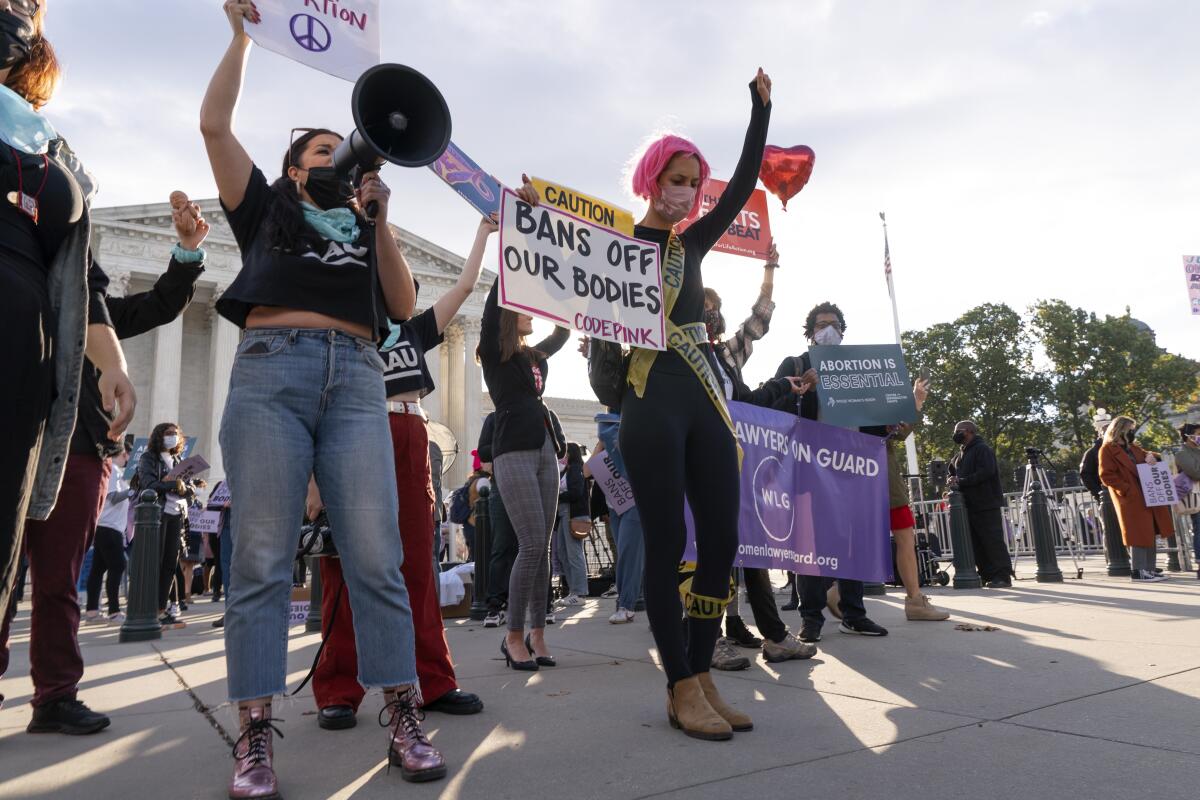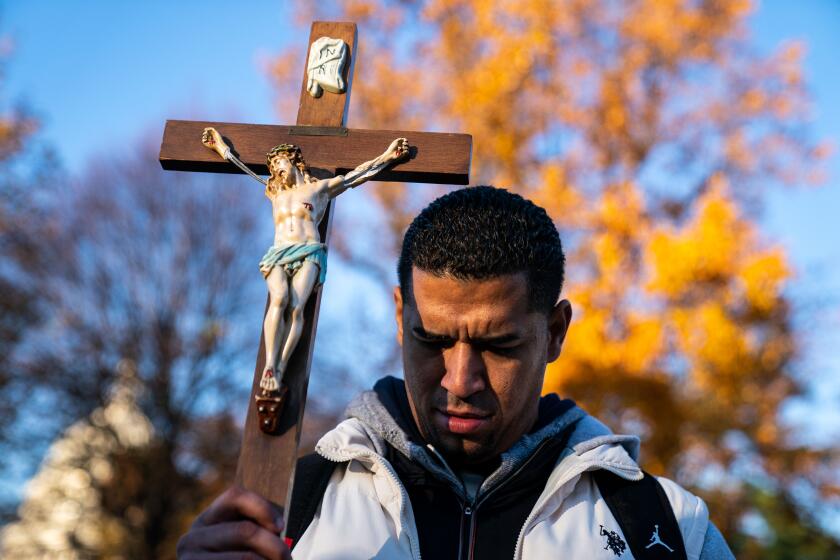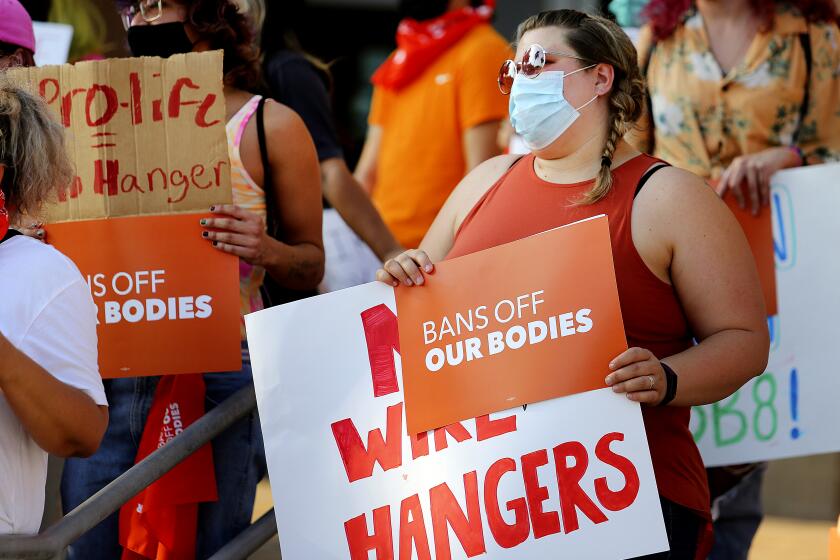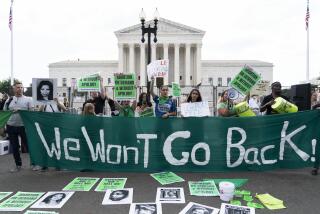Column: Mississippi abortion case threatens women’s rights and the Supreme Court’s standing

By the end of the oral arguments in Dobbs vs. Jackson Women’s Health Organization, it was clear the Supreme Court had painted itself into a corner. It now stands likely to impose serious damage on constitutional law, American women and, not least, its own national standing.
Dobbs vs. Jackson addresses the constitutionality of Mississippi’s ban on nearly all abortions after 15 weeks of pregnancy, with exceptions for medical emergencies or for “a severe fetal abnormality,” but not for rape or incest.
The national imagination has been feverishly focused on the case as a possible vehicle for expressly overruling the 50-year body of jurisprudence in Roe vs. Wade and Casey vs. Planned Parenthood of Southeastern Pennsylvania, with the consequence that states would be free to prohibit abortion from conception, as many states seem poised to do.
We know from their writings that two or three justices are champing at the bit to impose that view. But that would be a judicial crossing of the Rubicon of the gravest nature, and the questioning Wednesday morning made it fairly clear that it won’t happen in this case, at least not in so many words.
Justice Stephen Breyer emphasized that the court’s opinion in Casey underscored the maximal importance of precedent, or stare decisis, with regard to abortion. Roe and Casey, he explained, make a sort of “super” precedent, and an outright overrule would leave the court wide open to charges of shifting with the political winds or new appointees.
Supreme Court’s conservatives justices may have the votes to limit abortion to the first 15 weeks of a pregnancy or overturn Roe vs. Wade entirely.
Chief Justice John G. Roberts Jr. called Breyer’s point “quite compelling.” And the government’s argument against the Mississippi law dramatically underscored the implications of an overrule. It would be the first time in history, Solicitor General Elizabeth Prelogar told the court, that it had eliminated a constitutional right.
Roberts also emphasized that the question presented in Mississippi’s original petition had not been whether Roe and Casey should be overruled but the narrower issue of whether all pre-viability bans on abortions are unconstitutional. The state took on Roe and Casey directly only in its argument (and after Justice Amy Coney Barrett had been appointed to the court). In forceful questions for Prelogar, Roberts focused on Mississippi’s 15-week abortion limit, not the entire structure of abortion jurisprudence. His general incrementalism would weigh in favor of considering that and nothing more.
If the court won’t directly gut its abortion jurisprudence, is there a prospect that five justices — presumably the three progressives, and Roberts and Barrett — would reaffirm Roe and Casey and its central principle of protecting a woman’s right to terminate a pregnancy prior to viability?
Not really.
For starters, four justices voted to hear the case; they must have had some measure of confidence that a fifth colleague would go along with such a distinct challenge to abortion rights.
In the oral arguments, the identity of the four became reasonably clear. Justices Clarence Thomas, Samuel A. Alito Jr. and Neil M. Gorsuch were already sure bets, but where did Justices Brett Kavanaugh and Barrett stand? Kavanaugh’s questioning revealed him as the probable fourth. He presented Roe as a case in which the court had mistakenly taken one side in a social debate rather than maintaining neutrality, as it should.
The Supreme Court’s decision in the SB 8 case could restore abortion rights in Texas. But that’s not why it will be one for the books.
His position is tendentious, if not completely muddled. If the right to abortion has constitutional underpinnings, there would be nothing “neutral” about the court allowing states to override women’s liberty.
Where will the court come out on Dobbs? It’s possible that Barrett will join the four that wanted to take the case in the first place to overrule Roe and Casey. It’s far more likely that she and Roberts will make six votes to uphold the Mississippi law.
The latter two will provide a narrow rationale for the decision: Namely that the Constitution does not require the viability line the court announced in Casey. And Mississippi’s 15-week abortion limit is not an “undue burden” because it gives women sufficient time to order their lives and make well-planned decisions about terminating a pregnancy.
On the other side, Justices Breyer, Elena Kagan and Sonia Sotomayor will say that by abandoning viability as the line for legal abortions, the court is not only overruling Roe and Casey without owning up to it, it is making a grievous mistake. They will be right.
Kagan, characteristically, zeroed in on the problem should the court purport to retain a basic abortion right but abandon the viability principle. Dozens of states wait in the wings looking to impose even more severe restrictions — for example the six-week limit that is currently wreaking havoc in Texas.
Where would that leave the court and the country? In a far worse and more unstable position than they now stand.
The upshot is this: A splintered court would be left to adjudicate case by case ever more draconian restrictions with no principle to apply. Conservatives assail Roe and Casey as unprincipled, but those cases drew lines grounded in medicine and roughly workable in practice. The new, supposed middle ground that the court is telegraphing would leave the justices open to a valid charge of ad hoc and nakedly unprincipled reasoning.
As for American women, they would find their liberty and rights subjected to state by state caprice in a way that the court has said for more than 50 years the Constitution forbids.
All in all, Dobbs is likely to do a tidal wave of damage that, to make matters worse, the court will feign to be a ripple.
More to Read
A cure for the common opinion
Get thought-provoking perspectives with our weekly newsletter.
You may occasionally receive promotional content from the Los Angeles Times.









